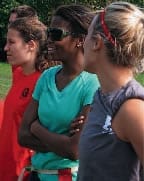At the beginning of my first semester as a Wharton MBA student, a sign-up list was passed around in class for the cohort flag football team. I had never touched a football before, and so was hesitant about signing up, but our cohort sports representatives implored us to participate. They insisted we wouldn’t regret it.
A few days later at Franklin Field, with a grey cohort t-shirt on and a heart full of courage, I tried my hand at the sport. Determined not to make a fool of myself, I had arrived early to get some practice under my belt. And although it was clear I wasn’t adept at such skills as, well, catching and throwing, I found myself to be quite well-suited to defense and became a regular on the team. It was a good team, too. After each game, we emailed a report of our triumphs to the rest of our cohort. Word got out that Cohort K was on a roll. Before long, we had fans. They actually came to our games, and we bonded as a team and a cohort. Our team’s performances were even discussed in class. Eventually, we went on to win the cohort championship. Our success on Franklin Field led to many other events, and our cohort friendships took hold.
Second semester brought a different challenge: We were asked to renovate a dilapidated house through the Wharton Rebuilding Together program. Fixing the house would be a bigger challenge than learning the rules of football. We arrived on Day 1 to find the kitchen floor waterlogged. It was sinking, too. The stairs had no banister or railings, creating a dangerous situation for Ms. Meyers, the elderly woman who lived there, not to mention her toddler great-grandchildren. We approached the renovation with a real sense of ownership—and community—and at the end of each Saturday’s work, sent out photos to the cohort to show off our progress. When we finally packed up for good, Ms. Meyers had a much safer home, and our cohort had grown closer still.
The bonds only grew stronger later that spring. One of the benefits of having such a diverse student body is the student- organized trips. During spring break, I joined 20 of my fellow students on a trek to South Korea. We explored. We shopped. We ate our way through Seoul. We even visited South Korean President Lee Myung-bak at the Blue House.
I learned during that trip that the Wharton community extends far beyond campus. Soon, I would learn just how strong the community is.
At the end of our first year, campus emptied out and I quickly began to miss my new friends far more than I could have anticipated. I can honestly say that many of my closest friendships have been formed within the past year, and as graduation nears, I am all the more aware of the value—and brevity—of my experience here. But I know that my Wharton bonds will remain strong long after graduation.
Besides, I have already seen how the Wharton community can come together when it matters most.
It’s no secret that, during these tough economic times, students are finding it increasingly difficult to find internships. Some have had their job start dates delayed.
Wharton alumni, however, have stepped up to help out, collaborating with the Wharton MBA Career Management office to create the Alumni Who Care program, which aims to connect students with summer job opportunities. This timely initiative has resulted in more than 100 opportunities for Wharton students.
The effort, I think, is a testament to the timeless, deep connection that exists between current and former Wharton students—a bond forged by a strong sense of fellowship that transcends the round walls of Huntsman Hall and the bricks of Locust Walk. It is a testament to the strength of the Wharton community—a community of which I am privileged to be a part.
Tyra Junaid, WG’10, came to Wharton from Southern Methodist University. She is chair of the Wharton Finance Committee and serves on the Student Life Advisory Board.

























